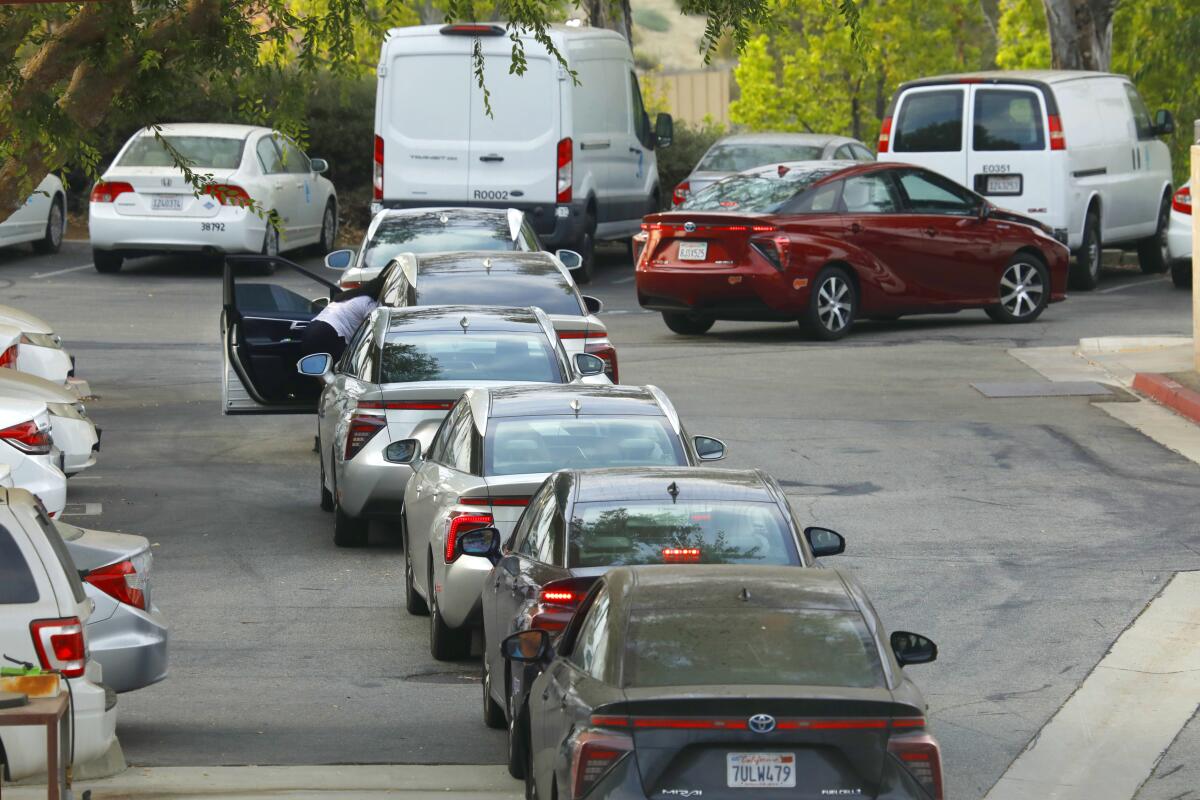Letters to the Editor: California doesn’t need a hydrogen backup plan for EVs

- Share via
To the editor: While I understand columnist George Skelton’s desire to have a backup plan for electric vehicles, hydrogen just doesn’t pencil out. Most methods for obtaining hydrogen fuel involve making lots of carbon dioxide. (“Hydrogen cars should be a bigger part of California’s battle against carbon emissions,” column, March 2)
Even “green hydrogen,” which is made with renewable energy, has its problems. For that, you have to use solar panels to make electricity to make hydrogen. Instead, you can use those same solar panels to fill up battery storage, which could be used at an electric vehicle charger. This is much more efficient than using that electricity to make hydrogen fuel.
Then there’s the fact that we still need to spend billions on research and development for hydrogen. We would do better to spend our money building out the electric grid to accommodate EVs. We should also change building codes to support EV charging, and we should subsidize the installation of chargers at existing apartment and condo complexes.
EV technology development is just about done. Now, it’s all about scaling and a small amount of refinement. No hydrogen backup plan is needed.
Tony Anthony, Torrance
..
To the editor: Thanks to Skelton for remembering there is a clean-energy alternative to electric vehicles.
The batteries for electric cars cannot be recycled, and their building components are not renewable. These materials are being scraped out of the earth from Asia to Africa.
There are alternative fuels that are able to power combustion engines more cleanly than fossil gasoline. There used to be a real effort to use biofuels, and I’d like to know where that went and why it was replaced with environmentally damaging battery-electric power.
Linda Bradshaw Carpenter, Los Angeles
..
To the editor: Normally a fan of Skelton, I was disappointed in his column on hydrogen cars. While I know that some people believe that there won’t be enough grid capacity to handle all of the future electric cars, it’s conjecture at this point and certainly not a fact.
Skelton mentions charging for people without garages. There are already people who depend on public stations to charge their vehicles. There’s no reason we can’t expand the number to accommodate all who need them. We just need the political will.
And charging during a blackout? Last time I looked, all the hydrogen stations run on electricity. And by the way, more electric vehicles are being designed so that if there is a power outage, the owner can power their home with their car.
I’m not against hydrogen for cars, but let’s not build a phony case to promote it.
Bruce Weiner, San Marcos
..
To the editor: Skelton mentions the 300 to 400 miles a hydrogen-fueled car can travel on a full tank. Last December, I bought a used 2019 Toyota Mirai, a hydrogen car. I am lucky to get to get 240 miles after a fill-up.
Toyota and Hyundai, the only current manufactures of fuel-cell vehicles, provide $15,000 in complimentary hydrogen fuel with the purchase or lease of a car. Since my car is used, Toyota gave $15,000 to the original owner or lessee, and then $15,000 to me.
This can hardly be a sustainable business model.
Randy Mathews, Whittier



